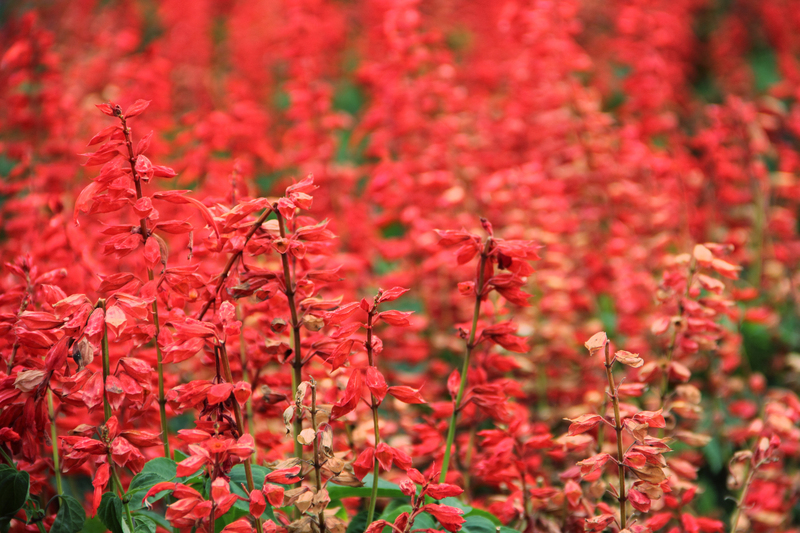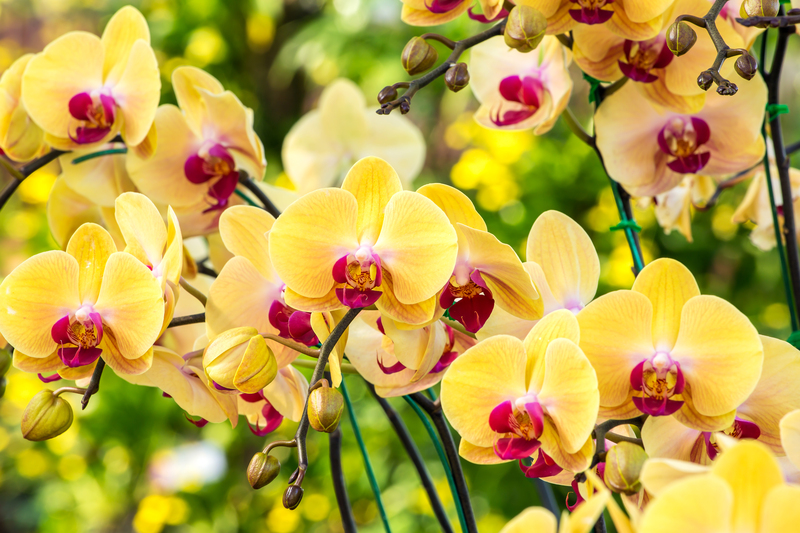Unlock the Secrets to a Brimming Herb Garden
Posted on 18/06/2025
Unlock the Secrets to a Brimming Herb Garden
Are you dreaming of a lush, thriving herb garden right in your backyard or perhaps on your windowsill? Unlocking the secrets to a brimming herb garden isn't just about having a green thumb; it's about understanding the art and science behind flourishing herbs.
In this in-depth guide, we'll reveal the most effective tips, essential techniques, and expert strategies for cultivating a garden bursting with aromatic, flavorful, and healthy herbs. Discover how to transform any space into a herb haven - whether you're a city dweller or tending a rural plot.
Why Grow Your Own Herb Garden?
Growing a vibrant herb garden is more than a hobby; it's a lifestyle choice that brings freshness, flavor, and well-being into your daily life. Here are some compelling reasons to start your own green oasis:
- Freshness On Demand: Harvest herbs straight from your garden for the freshest taste.
- Cost Effective: Save money by growing rather than buying herbs.
- Health Benefits: Use chemical-free, organic herbs for culinary and medicinal purposes.
- Aromatic Ambiance: Infuse your home and outdoor spaces with natural fragrances and beauty.
- Personal Satisfaction: Experience the joy of nurturing and harvesting your own plants.

Getting Started: Choosing the Right Spot for a Brimming Herb Garden
The first step to unlocking herb garden success is location. Whether you have a sunny backyard, a balcony, or just a kitchen windowsill, herbs can thrive almost anywhere. Here's what to consider when choosing the best spot:
- Sunlight: Most herbs need 6-8 hours of sun per day. South-facing locations are ideal.
- Soil Drainage: Well-draining soil prevents root rot and disease.
- Accessibility: Place your garden where you can easily tend and harvest herbs.
- Protection: Shelter delicate herbs from strong winds and heavy rain.
Container Herb Gardens vs. In-Ground Herb Gardens
Can't decide between growing herbs in containers or directly in the ground? Here's a breakdown to help you choose:
- Container Gardens: Perfect for patios, balconies, and limited space. Move pots to optimize sun exposure.
- In-Ground Gardens: Allow for larger, more diverse plantings with less need for watering.
Tip: Mix and match! A few pots of basil on your windowsill and a lavender patch in your yard can offer the best of both worlds.
Unlock the Secrets: Selecting the Best Herbs for a Thriving Garden
Choosing the right herbs is crucial to unlock your garden's full potential. Consider your climate, favorite dishes, and available space.
Top Culinary Herbs for a Productive Herb Garden
- Basil: Loves warmth, perfect for Italian dishes.
- Parsley: Hardy and versatile in both curly and flat-leaf varieties.
- Cilantro: Fast-growing, essential for salsas and curries.
- Chives: Easy to grow, mild onion flavor.
- Thyme: Hardy perennial with multiple culinary uses.
- Rosemary: Woody shrub, drought-resistant, fragrant.
- Mint: Best kept in containers due to its spreading nature.
- Dill: Annual herb, essential for pickling.
- Sage: Flavorful, great for savory dishes and stuffing.
Medicinal and Aromatic Herbs Worth Growing
- Lemon Balm: Calming and citrus-scented, good for teas.
- Lavender: Promotes relaxation, beautiful blooms.
- Chamomile: Soothing flowers for herbal teas.
- Oregano: Antibacterial properties, excellent in Mediterranean cooking.
- Echinacea: Immune-boosting perennial.
Pro Hint: Start with 3-5 easy-to-grow herbs and expand as you gain confidence.
Soil Secrets: The Foundation of a Bountiful Herb Garden
A brimming herb garden starts with fertile, well-amended soil. Herbs require a balance of nutrients, aeration, and moisture retention.
How to Prepare Your Soil
- Loosen the Soil: Use a garden fork or trowel to break up compacted dirt.
- Add Organic Matter: Incorporate compost, worm castings, or well-rotted manure.
- Check pH: Most herbs prefer pH 6.0-7.5. Use a home pH meter for accuracy.
- Ensure Drainage: If soil is dense, mix in sand or perlite for better airflow.
Never plant herbs in soggy or waterlogged soil.
Planting Your Herb Garden: Step-by-Step for Success
1. Sowing Seeds or Buying Transplants?
- Seeds: Cost-effective with a wider variety. Great for annual herbs and adventurous gardeners.
- Transplants: Convenient and reliable, especially for perennials. Look for healthy, pest-free starts.
2. Planting Timing and Technique
- Timing: Most herbs are planted in spring after the last frost. Some, like parsley and cilantro, can tolerate cooler temperatures.
- Spacing: Provide enough room for mature growth--check seed packets or plant tags for guidance.
- Depth: Plant seeds at 2-3 times their diameter; plant seedlings to the same depth as in their pots.
3. Watering Wisely
- Initial Watering: Water thoroughly after planting to establish roots.
- Routine Care: Most herbs prefer soil that is moist, but not wet. Overwatering leads to root rot.
- Mulch: Apply a light layer of organic mulch to retain moisture and suppress weeds.
Unlocking the Path to Continuous Growth: Herb Garden Maintenance Secrets
A thriving herb garden needs regular attention. Here are the critical maintenance tasks to keep your herbs plentiful and healthy:
- Pruning and Harvesting: Pinch back new growth to promote bushiness and avoid flowering (bolting) for herbs like basil and cilantro.
- Feeding: Use a diluted organic fertilizer once a month during active growth.
- Weeding: Remove competition regularly to ensure your herbs get all the nutrients and water.
- Pest Control: Neem oil, insecticidal soap, and hand-picking bugs can help keep pests at bay without harsh chemicals.
- Disease Management: Avoid overhead watering and ensure good air circulation to prevent mildew and rot.
Did You Know? Regular harvesting actually encourages most herbs to produce more leaves, leading to a brimming supply all season!
Advanced Secrets: Companion Planting for a Flourishing Herb Oasis
Unlock even more garden abundance by practicing companion planting. Certain herb combinations actually benefit each other by repelling pests, improving flavors, and attracting pollinators.
- Basil + Tomatoes: Basil repels tomato hornworms and enhances fruit flavor.
- Thyme + Cabbage: Thyme deters cabbage moths.
- Dill + Cucumbers: Dill attracts beneficial insects for pest control.
- Chives + Carrots: Chives repel carrot flies.
- Rosemary + Beans: Rosemary discourages bean beetles.
Tip: Avoid planting mint near other herbs (except in containers) due to its invasive roots.
Harvesting and Preserving Your Herb Bounty
Unlock the joy of a brimming herb garden by harvesting at the right time and preserving herbs for year-round use. Here's how:
When and How to Harvest Herbs
- Early Morning: Herbs are most flavorful before the sun dries their essential oils.
- Frequency: Pick leaves regularly to encourage regrowth.
- Method: Use sharp scissors or pruners; avoid taking more than one-third of a plant at a time.
Preserving the Harvest
- Drying: Tie small bunches and hang upside down in a cool, dry spot.
- Freezing: Chop and freeze in olive oil or water, using ice cube trays.
- Infusions: Make herbal oils and vinegars for cooking or gifts.
- Storing: Keep dried herbs in airtight jars out of direct sunlight.
Unlock the Joy: Herb Garden Uses and Creative Ideas
- Culinary Delights: Enhance every meal, from pasta sauces to herbal teas and salads.
- Natural Remedies: Soothe with homemade teas, salves, and infusions.
- DIY Skincare: Create scrubs, soaps, and bath salts with lavender, mint, and calendula.
- Herbal Decor: Make fragrant wreaths or table arrangements for seasonal flair.
- Pollinator Paradise: Attract bees and butterflies with flowering herbs like chives and oregano.
Solving Common Herb Garden Problems
Building a thriving herb oasis comes with challenges, but with the right knowledge, you can overcome them:
- Leggy Herbs: Usually caused by insufficient sunlight. Move pots or prune for bushier growth.
- Yellow Leaves: Can result from overwatering or poor drainage. Check soil and adjust watering.
- Pest Infestations: Use natural remedies first; relocate affected plants if necessary.
- Slow Growth: Refresh soil nutrients or check for crowding roots.
Remember: Every gardener faces setbacks - learning from them is part of your journey to a full, abundant herb garden!
Unlock Brimming Success: Expert Tips for Extraordinary Herbs
- Rotate Crops: Change planting locations yearly to prevent soil-borne diseases.
- Label Everything: Use weatherproof markers to identify herb varieties.
- Encourage Pollinators: Let some herbs bloom for bees and butterflies.
- Succession Planting: Sow seeds every few weeks for a continuous harvest.
- Get Creative: Grow herbs vertically, in hanging baskets, or integrate them into landscaping.

Bring It All Together: Cultivating a Brimming Herb Garden is Within Reach
Unlocking the secrets to a brimming herb garden blends the joy of gardening with practical rewards in the kitchen and beyond. With the right herbs, careful attention, and a willingness to experiment, anyone can grow a lush, plentiful herb garden, overflowing with life and flavor.
Whether you choose classic favorites for the kitchen or medicinal and aromatic varieties, the rewards are endless. So roll up your sleeves, dig in, and let your green oasis flourish - one aromatic leaf at a time!
FAQs: Unlock the Secrets to a Brimming Herb Garden
- What are the easiest herbs to grow for beginners?
Try basil, chives, mint, parsley, and oregano for reliable growth and minimal fuss. - How often should I water my herb garden?
Water deeply when the top inch of soil is dry. Herbs prefer a cycle of moist, then slightly dry soil rather than consistently wet conditions. - Can I grow a brimming herb garden indoors?
Yes! Use sunny windowsills or grow lights, and choose compact herbs like basil, chives, and cilantro for best results. - When is the best time to harvest herbs?
Early morning, just before flowering, is ideal for the most potent flavors and oils. - How do I dry or preserve my fresh herbs?
Hang herbs in bunches to air-dry, freeze them chopped in ice cubes, or infuse them into oils and vinegars.
Ready to unlock the secrets to your very own brimming herb garden? Embrace these expert insights and start cultivating your fresh, fragrant, and flavorful oasis today!
Latest Posts
Eco-Friendly Solutions: Organic Waste to Soil
Elevate Your Landscape with Artistic Hedge Trimming
5 Practical Ways to Achieve a Budget-Friendly, Low Maintenance Garden
Find Tranquility in Your Garden with Zen-inspired Ideas
Flourish with Ease: 9 Fundamental Gardening Tips for Starters



